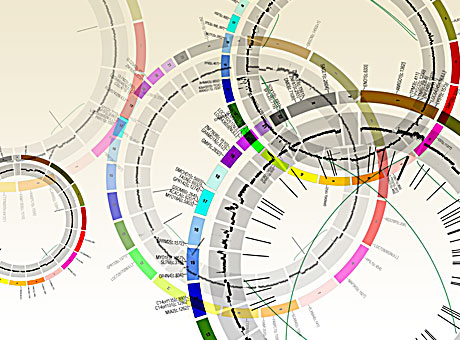
Circos plots, above, are a visual representation of genomic disruptions in breast cancer.

Circos plots, above, are a visual representation of genomic disruptions in breast cancer.
Washington University’s Genome Institute has received a $114 million grant to continue its groundbreaking genomic research. The institute is a world leader in unraveling the genetic basis of cancer, deciphering the genetic differences among humans around the globe, and exploring the DNA of microbial genes that naturally coexist with human genes in the body.
The four-year grant comes from the National Human Genome Research Institute (NHGRI), part of the National Institutes of Health (NIH). Washington University’s Genome Institute is one of only three large federally funded genome centers in the United States.
The Genome Institute and other large-scale centers are sequencing production and intellectual powerhouses for the NHGRI.
“The new grant allows us to build on our earlier work and more effectively decode the information contained in our genomes to better understand, diagnose and cure disease,” says Richard K. Wilson, PhD, director of the Genome Institute and a professor of genetics. “In this next phase of funding, we will discover new sequence variants that can be used to select the best treatment options for patients — a primary goal of personalized medicine.”
The new grant underscores the expertise of the Genome Institute, which contributed heavily to the Human Genome Project. A portion of the cancer genomic research at the institute is being carried out as part the Cancer Genome Atlas, a collaboration funded by NHGRI and the National Cancer Institute. The Genome Institute’s researchers also are playing a leading role in the 1,000 Genomes Project and the Human Microbiome Project.